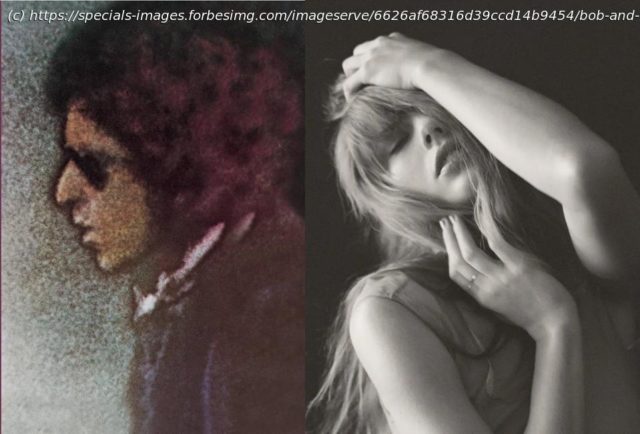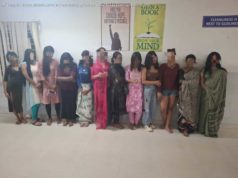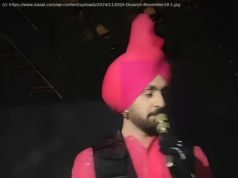Taylor Swift’s 11th album evokes echoes of Bob Dylan’s 1975 classic, which marked a turning point in his trajectory as generational icon.
Stop me if you’ve heard this one before: a generational icon singer-songwriter who has not performed live in a while headlines a blowout stadium tour, giving shows that sum up the various “eras” of their career, from their earliest days as a precocious young newcomer, through their triumphant crossover into pop, to their more low-key narrative recent work. The artist inspires a following of fans that pore over their lyrics with the intensity of Talmudic scholars, attempting to unravel deep mysteries and inside jokes. The artist is romantically linked with a long list of glamourous film stars, models and musicians, especially now that a long-term relationship appears to have ended. Though they guard their private life jealously, their every public move and appearance makes news.
When the artist’s long-anticipated new album appears, it avoids the flashy pyrotechnics of their best-known work in favor of a set of low-key midtempo songs that detail doomed relationships, casual encounters with inappropriate lovers, bitter breakups and tearful goodbyes. At moments, the artist lashes out lyrically against the expectations of fans and the often idiotic discourse that surrounds them in the media. And it is an immediate sensation.
I had this album playing in my car as I drove to visit a couple of hardcore Swiftie friends to listen to 34 year-old Taylor Swift’s eleventh official album, The Tortured Poets Department, over the weekend. I’m relatively new to Swift’s work but have come to admire it. The glittering Millennial Swift draws only occasional comparisons to dusty Boomer icon Dylan for obvious reasons: their aesthetics, influences. audiences, and relationship to musical history could scarcely be more different. Same with the cultures and politics that form the backdrop to their careers. Swift’s outspoken feminism has changed the culture. Dylan emerged before feminism, and it sometimes shows. But to me, the congruencies between Tortured Poets and Blood bring their similarities into greater focus.
Like Taylor Swift, Bob Dylan began his professional career extremely young: 20 in his case, 16 in hers. They both began working in genres with strong boundaries and conventions (acoustic folk and Nashville-style country), exhibiting early facility with songwriting combined with a singular focus and ambition. Both made controversial moves toward pop music in a bid to broaden their audience. Dylan was famously booed performing with an electric band at the Newport Folk Festival in 1965. He seemed to shake it off.
Most of Dylan’s early notoriety came from the topical subjects of songs like “Blowin’ in the Wind,” “The Times, They Are A-Changin’,” and “A Hard Rain’s a-Gonna Fall,” which reflected the anxieties of an American culture roiled by the atomic threat of the Cold War and the rising Civil Rights movement. Swift only rarely, and very obliquely, tackles this kind of subject matter. Her politics are of the more personal variety, at least in her music.
But from the beginning, Dylan was also the innovator of the kind of bitter romantic kiss-off songs that are Swift’s stock in trade.






